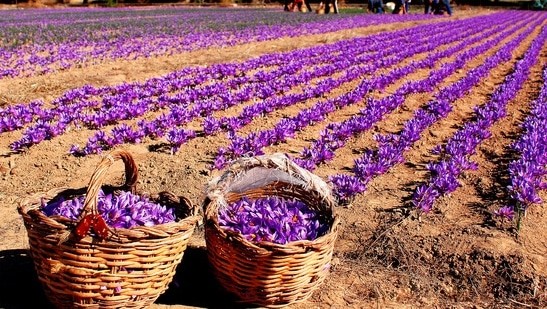Pulwama, Dec 19: The prolonged dry spell in the plains of Kashmir has significantly delayed the germination of rabbi crop seeds, raising concerns among farmers about reduced yields.
While the upper reaches of the valley have experienced occasional snowfall, the plains have witnessed no major precipitation over the past few months. Farmers from various parts of the valley have expressed apprehension over the delayed germination, which they fear will impact overall yield.
Irshad Ahmad Dar, a farmer from Patal Bagh village in south Kashmir’s Pulwama district, said the area has endured severe dryness this winter. “There has been no significant precipitation for the past four months,” he said, adding that the stress caused by dryness has adversely affected the germination of rabbi crop seeds such as oats, oilseeds, peas, garlic and onion.
Manzoor Ahmad, another farmer from Konibal village in Pampore, highlighted the damage to saffron crops. “The saffron crop requires moisture during three critical stages, one of which is after the harvesting of flowers,” he said, adding that this winter saw no substantial rainfall following the saffron flower harvest.
Ahmad said the lack of soil moisture has hampered root formation and vegetative growth of underground saffron corms. “The green photosynthetic leaves have turned yellow in many areas,” he said, adding that the dryness has already caused a 30% reduction in the crop, with further losses likely if the dry spell persists.
The farmer also expressed concern about the poor germination of pea seeds. “By this time last year, my pea crop had reached the vegetative stage, but this winter, it has yet to germinate,” he said.
Farmers from Tral, Pampore, Kakapora and Tahab areas also reported low germination rates in oilseeds and oats. “Around 80% of oilseeds have yet to germinate,” they said.
According to data, Jammu and Kashmir received only 19.9 mm of rainfall in the past two months, significantly below the normal average of 70.5 mm. Many areas have experienced a rainfall deficiency of 60% to 99% during this period.
Agriculture experts have cautioned that seeds which have already germinated are likely to survive the harsh winter, as they can endure frost.
They said the late-germinating seeds are at a higher risk of frost injury due to their tender nature. “The overall production is likely to be affected,” experts warned, advising farmers not to irrigate their fields at this time as it may lead to frost damage.
Dr. Mohammad Ashraf Bhat, Head of the Division of Plant Biotechnology at SKUAST-K, emphasised the importance of soil moisture for enzyme activation and the initiation of metabolic activity in seeds. “In the absence of soil moisture, enzymes remain inactive, preventing the stored carbohydrates in seeds from converting into sugars,” he said, “This directly affects cell division in the meristematic tissues within the seed embryo, ultimately hampering germination.”
Dr Bhat added, “By December 21, the taproot should ideally penetrate at least four inches into the soil to withstand damage caused by the alternating heating and thawing of the soil surface.”








